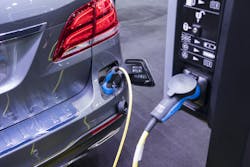New York State DOT Awarded $13M to Improve EV Charging Infrastructure Reliability Across the State
The New York State Department of Transportation (NYSDOT) has been awarded $13 million by the US Department of Transportation Federal High Administration’s Electric Vehicle Charger Reliability and Accessibility Accelerator Program.
This program award will allow the NYSDOT to enhance the reliability of EV charging ports by repairing or replacing broken or non-operational charging ports across the State.
“New York State is the national leader when it comes to investing in innovation to combat the plague of global climate change,” said New York Governor Kathy Hochul. “This federal award will enable us to keep our existing electric vehicle charging infrastructure in a state of good repair while we continue to make investments in the Empire State’s electric vehicle future.”
Currently, there are more than 10,000 publicly accessible Level 2 and direct current fast chargers (DCFC) ports available throughout New York.
With this funding, New York will ensure that these publicly accessible DCFC and Level 2 chargers are working properly and are available to motorists throughout the state.
To complete the necessary repairs and replacements, the NYSDOT has partnered with the New York State Energy Research and Development Authority (NYSERDA), which will enter into agreements with charging providers and charging station owners.
Under these agreements, NYSERDA will require that stations receiving funding be operational within 12 months of award disbursement and that stations must remain operational for at least five years.
Covered costs can include hardware, permitting, service upgrades, and labor costs needed to properly repair or replace EV equipment to ensure the equipment remains operational for that five-year period.
“NYSERDA looks forward to strengthening access to reliable EV charging for New Yorkers through this federal funding, so a charger is available when needed across the state,” said NYSERDA President and CEO Doreen Harris. “Keeping our infrastructure modern and strong encourages more clean cars on our roadways to meet the State’s zero-emission and climate goals while making the air cleaner in our communities.”
About the Author
EnergyTech Staff
Rod Walton is head of content for EnergyTech.com. He has spent 17 years covering the energy industry as a newspaper and trade journalist.
Walton formerly was energy writer and business editor at the Tulsa World. Later, he spent six years covering the electricity power sector for Pennwell and Clarion Events. He joined Endeavor and EnergyTech in November 2021.
He can be reached at [email protected].
EnergyTech is focused on the mission critical and large-scale energy users and their sustainability and resiliency goals. These include the commercial and industrial sectors, as well as the military, universities, data centers and microgrids.
Many large-scale energy users such as Fortune 500 companies, and mission-critical users such as military bases, universities, healthcare facilities, public safety and data centers, shifting their energy priorities to reach net-zero carbon goals within the coming decades. These include plans for renewable energy power purchase agreements, but also on-site resiliency projects such as microgrids, combined heat and power, rooftop solar, energy storage, digitalization and building efficiency upgrades.
